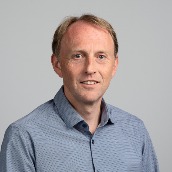2023 Izatt-Christensen Award for Prof. Sijbren Otto

Sijbren Otto, professor of systems chemistry at the Stratingh Institute for Chemistry, has received the 2023 Izatt-Christensen Award for being a pioneer of supramolecular systems chemistry, taking supramolecular chemistry into completely new directions. The award will be presented to Otto at the 17th International Symposium on Macrocyclic and Supramolecular Chemistry that will be held in Reykavík, Iceland at the end of June this year.
Otto joined the University of Groningen in 2009, where he rapidly rose through the ranks to his current position as full professor. His research focusses on the interplay between noncovalent interactions and chemical reactivity. Otto has developed supramolecular systems with life-like properties. His ultimate aim is to create life de-novo, not by attempting to re-create life as we know it, but by putting together a completely new system that harbours all the essential characteristics of life. The quality of his work has attracted substantial funding (e.g. ERC StG and AdG, NWO Vici), involvement in large initiatives (e.g. Functional Molecular Systems Gravitation Programme), multiple prizes (e.g. RSC Supramolecular Award) and membership (e.g. KNAW membership).
Since the beginning of his independent career, Otto has served a leading role in establishing the young field of systems chemistry: he chaired two consecutive EU COST Actions, rallying >95 European research groups around this topic. He coordinated two ITNs (EU-based training networks for PhD students), co-founded the first journal in the field (J. Syst. Chem.), and co-initiated and (vice)chaired the Gordon Conference series on systems chemistry. He also played a key role in setting up the Dutch Origins Center. In Groningen, in collaboration with colleagues from biochemistry, he introduced systems chemistry in the chemistry curriculum, setting up a new course entitled “Synthetic biology and systems chemistry”.
More about Otto can be found at the RUG website.
